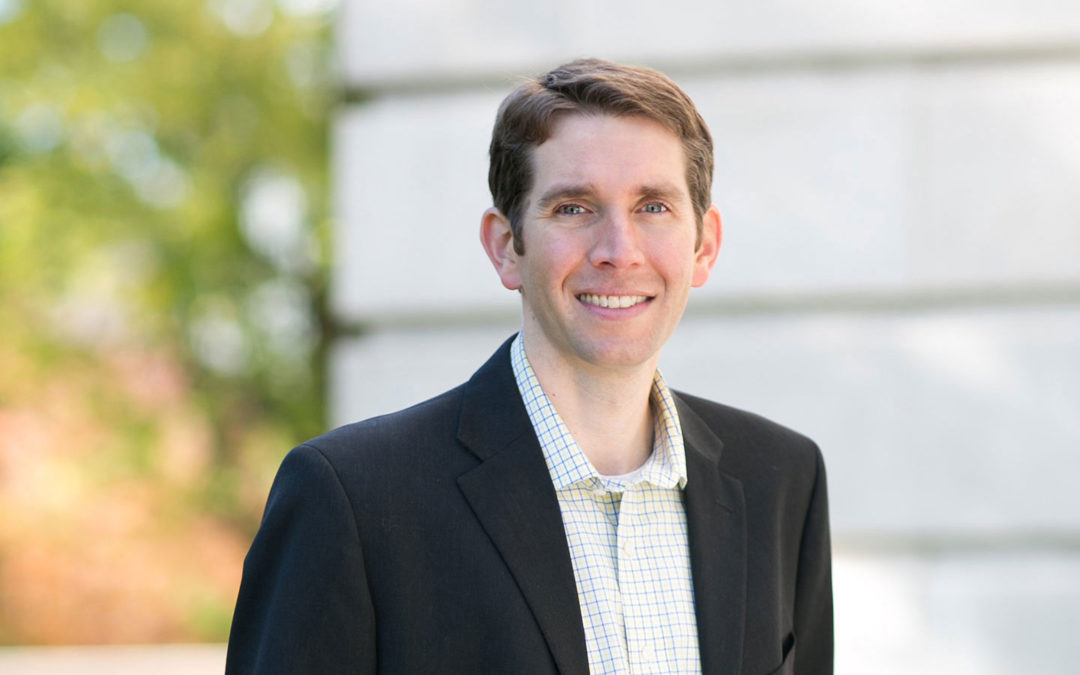
by Tyler Huebner | Mar 16, 2020 | Public Service Commission, RENEW Wisconsin
Dear RENEW Wisconsin Members and Supporters,
First and foremost, I wish you, your families, and everyone well during this unprecedented time regarding the novel coronavirus and COVID-19. I urge you to continue following the ever-changing guidelines coming from the Center for Disease Control and your elected officials at all levels to help keep each other safe.
With that said, last week Governor Tony Evers appointed me to be the next Commissioner at the Public Service Commission of Wisconsin.
With this change, I will be leaving RENEW Wisconsin, and my last day is today. I started with RENEW in June of 2013, and I want to thank you all for your support of the organization, and of me, since then.
It has been extremely rewarding to be the Executive Director of this organization, and I feel very proud of the organization’s growth and successes during my period here.
Heather Allen will be the organization’s Interim Executive Director starting immediately. Heather has been with the organization for nearly two years, and she will do an excellent job advancing its mission and priorities going forward. You can reach her at heather@renewwisconsin.org or 608-255-4044 extension 1.
In addition to Heather, the rest of the RENEW staff is here to support you however they can.
Thank you, again, for the opportunity to serve this organization and all of you in this role. It has been a distinct pleasure!
Sincerely,
Tyler Huebner
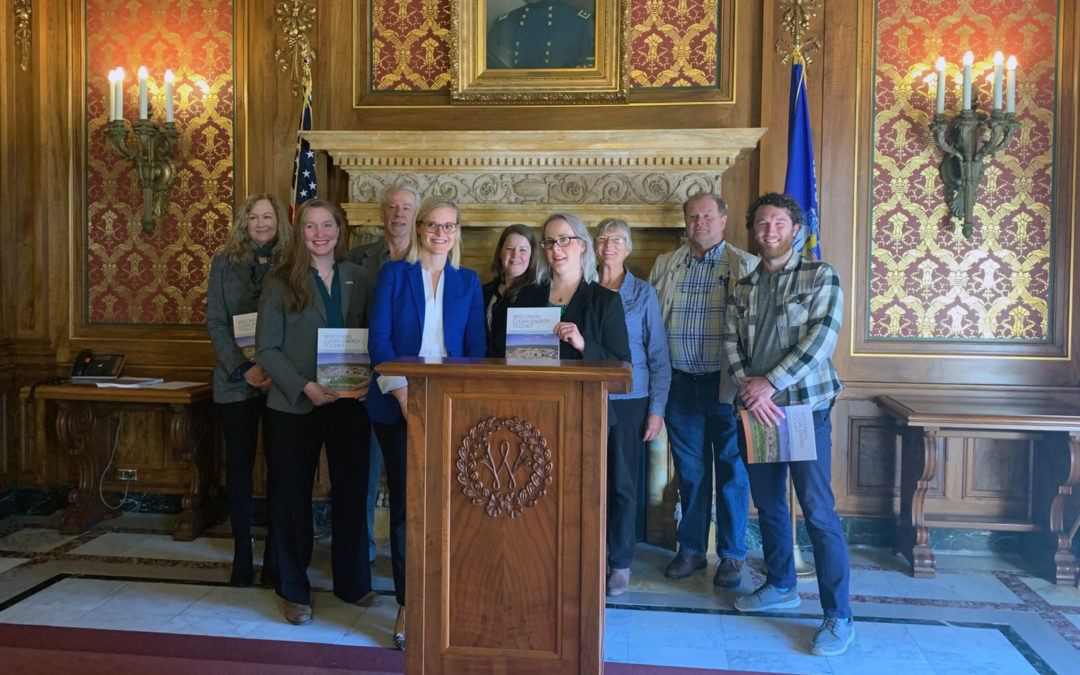
by Heather Allen | Mar 10, 2020 | Advocacy, Community, Local Government, Local Initiatives, Policy, Programs, Public Service Commission, RENEW Wisconsin, Renewables
RENEW Wisconsin, Wisconsin Conservation Voters, and Sierra Club have released the Wisconsin Clean Energy Toolkit: Developing a Clean Energy Plan for Your Community.
Towns, villages, cities, and counties in Wisconsin are building the renewable energy economy. The Wisconsin Clean Energy Toolkit recognizes this leadership in Wisconsin communities and the opportunities to expand these efforts across the state.
As part of its statewide launch, clean energy leaders, including Wisconsin State Treasurer Sarah Godlewski, addressed members of the media and the public across the state on March 10th, 2020 to announce the release.
“The Wisconsin Clean Energy Toolkit will help communities develop clean energy plans, which are good for the environment and also can be good for a community’s bottom line,” said State Treasurer Sarah Godlewski. “I’ve seen this firsthand as the Chair of a $1.2 billion trust fund, how we’ve helped local governments finance projects such as solar panels that saved taxpayers’ money. I hope communities across the state see us as a partner in their projects to address climate change and lower energy costs.”
Local communities across Wisconsin are eager to develop and implement clean energy plans. Often, they struggle with how to begin from a technical perspective and how to engage their communities.
“Smaller communities often lack the staff to conduct clean energy assessments and make recommendations,” said Jennifer Giegerich, Government Affairs Director for Wisconsin Conservation Voters. “This toolkit is a comprehensive resource for those considering a commitment to clean energy.”
The Wisconsin Clean Energy Toolkit is a comprehensive guide to energy policy options in Wisconsin. The toolkit is a resource designed to help guide communities of varying sizes and with differing resources as they consider, craft, and implement clean energy policies, and how to ensure the greatest return on potential clean energy investments.
“Local governments have heard from their residents; they want to shift to clean, renewable energy,” said Heather Allen, Program Director for RENEW Wisconsin. “But they need resources and technical support to make the transition. This toolkit offers practical strategies to help communities access affordable clean energy.”
“The Public Service Commission’s Office of Energy Innovation is committed to delivering programs that have a measurable impact on our state, this is why we’ve supported the Energy Independent Communities and will continue to support (with grants and technical assistance like this guide) communities and Tribal Nations on the road to our clean energy future,” Megan Levy, Local Energy Programs Manager & Energy Assurance Coordinator, Office of Energy Innovation, Public Service Commission of Wisconsin.
The Clean Energy Toolkit provides information to help local communities including:
- How to understand current state policies and regulations that impact energy use in Wisconsin
- Guidance on how to commit to clean energy
- How to build support in the community for clean energy policies
- How to establish a baseline of current energy use in the community, and how to set benchmarks to track progress toward long-range goals
- Defines equitable carbon reduction strategies that protect vulnerable communities when making the transition to clean energy, and how to ensure all impacted constituencies have a voice at the decision-making table
- Provides an overview of various financing options available to local governments to pursue clean energy
“As Wisconsinites demand action on climate change, local communities are answering those calls,” said Elizabeth Ward, Director for Sierra Club Wisconsin. “We’re glad to provide a resource for those communities as they demonstrate the leadership we’re missing at the federal level.”
The toolkit is available to download at www.wicleanenergytoolkit.com. For additional information, questions, or to request a paper copy of the toolkit, please contact Heather Allen (heather@renewwisconsin.org)
Visit www.wicleanenergytoolkit.com to learn more.
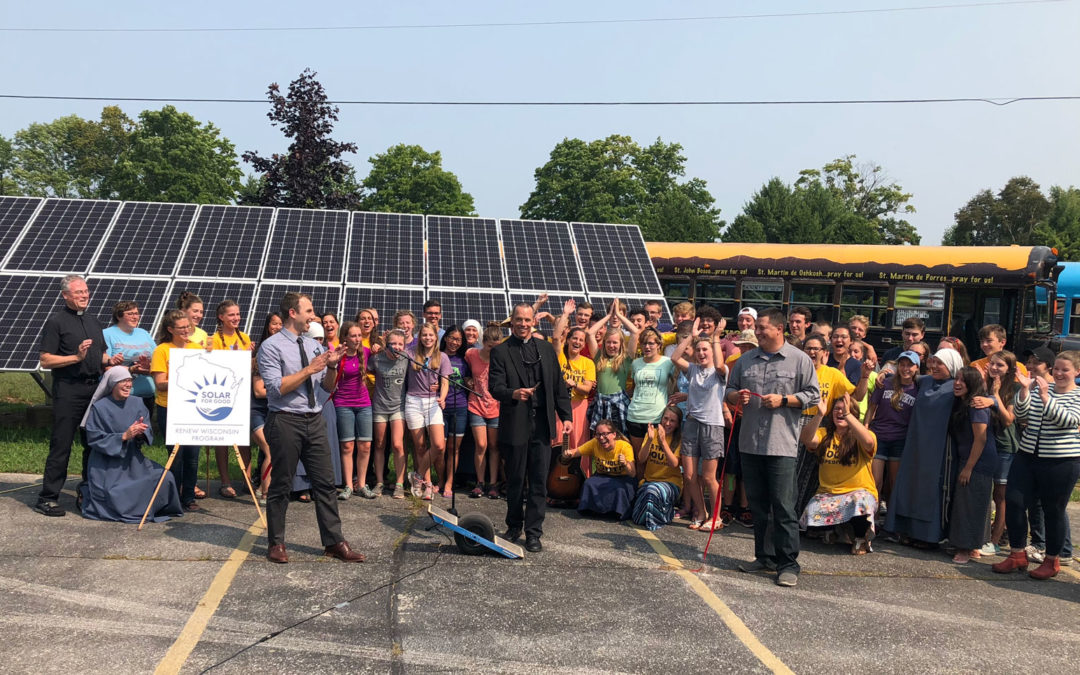
by Sam Dunaiski | Mar 2, 2020 | Local Initiatives, RENEW Wisconsin, Solar, Solar for Good
RENEW Wisconsin’s Solar for Good program has opened its sixth round of donations to help Wisconsin nonprofits install solar power. Grant applications are due Wednesday, May 1, 2020 at www.renewwisconsin.org/solarforgood.
Since 2017, the Solar for Good program has partnered with 75 Wisconsin nonprofit organizations to go solar. When completed, these organizations will have installed 91 solar arrays for a total of 3.24 megawatts of solar electricity, enough to power nearly 700 households.
Solar for Good is administered by RENEW Wisconsin, a statewide renewable energy nonprofit organization. Through a generous donation from the Couillard Solar Foundation, Solar for Good supplies winning nonprofits with solar panels to reduce the overall cost of installing solar power.
This is Solar for Good’s sixth award cycle, and the program has assisted nonprofits of all types and sizes across Wisconsin. The grantees include 25 houses of worship, 4 environmental conservation groups, 5 animal shelters, 17 schools and education centers, 2 veterans’ groups, and 20 housing providers.
To date, 45 organizations have completed installation of 51 solar arrays. Around $488,000 worth of grants have been dispersed from the Couillard Solar Foundation, and these grants have spurred over $4 million in solar investment across Wisconsin.
By accepting a Solar for Good award, nonprofits agree to promote the environmental and economic benefits of solar power to their communities. Winning organizations educate their members about solar power and are able to showcase their projects’ benefits.
Grant applications for Solar for Good must be received by Wednesday, May 1st 2020. Decisions and award announcements will be made on or before Wednesday, May 15th, 2020. RENEW Wisconsin plans on holding an additional round of Solar for Good funding in September of 2020.
How to apply for a solar grant
Organizations can learn more and apply at www.renewwisconsin.org/solarforgood. In order to be eligible, the organization must be a registered nonprofit organization located in Wisconsin, be in good financial standing, be ready to install solar, and agree to participate in educating community members about the benefits of solar energy. If approved for a solar panel award, all fundraising, design and installation for the solar project must be completed within 12 months.
Applications for the Spring 2020 Solar for Good cycle must be received by Wednesday, May 1st 2020. Decisions and award announcements will be made on or before Wednesday, May 15th, 2020.
For organizations looking at solar power for the first time, technical assistance grants are available to fund a solar site assessment (up to $250) or engineering review (up to $500) for their solar array. These applications will be reviewed separately from the applications for solar panel awards and will be allocated on a first-come, first-served basis.
About Solar for Good
RENEW Wisconsin’s Solar for Good initiative fosters the expansion of solar power among mission-based nonprofits in Wisconsin. Through a generous partnership with Couillard Solar Foundation, RENEW Wisconsin awards solar panels to nonprofit organizations, helping them switch to clean, renewable, solar energy. More information can be found at www.renewwisconsin.org/solarforgood/.
About RENEW Wisconsin
RENEW Wisconsin is a nonprofit organization which promotes renewable energy in Wisconsin. We work on policies and programs that support solar power, wind power, biogas, local hydropower, geothermal energy, and electric vehicles. More information on RENEW’s website: www.renewwisconsin.org.
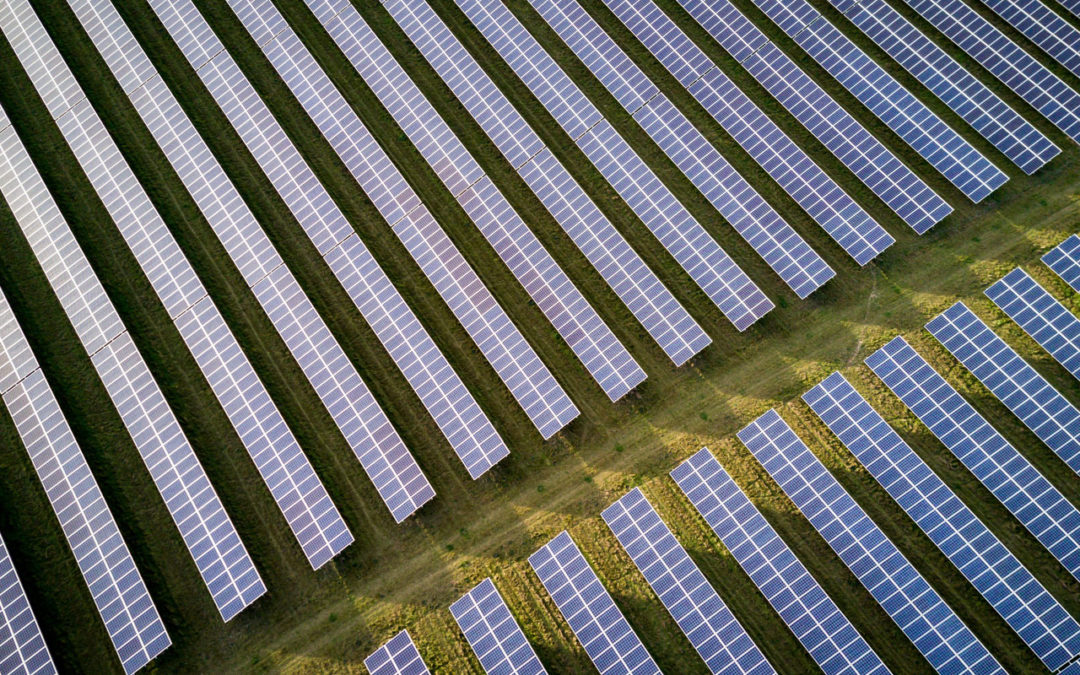
by Michael Vickerman | Feb 20, 2020 | Public Service Commission, Renewables, Solar, Utilities, Utility Scale
The Public Service Commission today cleared the path for the Badger Hollow solar farm to become a utility-owned generating asset in its entirety. Approved in April 2019 and now under construction, the 300 megawatt (MW) plant in western Iowa County will soon be co-owned by a third utility, Milwaukee-based Wisconsin Electric Power Company (WEPCO). Chicago-based Invenergy is the developer for Badger Hollow and will oversee the construction process until its completion in 2021
As a result of today’s action, WEPCO and Madison Gas and Electric (MGE) will jointly acquire a 150 megawatt share of this facility, which should start sending power into the grid by the end of 2020. Shares of the 300 MW solar farm will be divided equally between WEPCO, MGE, and Green Bay-based Wisconsin Public Service.
After reviewing the applicants’ filings, the PSC determined that both MGE and WEPCO need new generating capacity in the near future, and that this 150 MW increment of Badger Hollow would be part of the least-cost expansion plan for both utilities.
RENEW submitted a letter of support for the acquisition, as did the cities of Milwaukee and Madison. Calling attention to the state’s clean energy goals as well as those of the two cities and the utilities that serve them, our comments emphasized the economic and environmental value that Badger Hollow will yield to utility customers as well as to project participants, host communities, and the state as a whole.
The PSC’s approval effectively brings the first chapter of utility-scale solar development in Wisconsin to a close. Since June 2018, the PSC has reviewed four proposals to build nearly 700 MW of in-state renewable generating capacity, and gave the green light to all of them. The following table summarizes these projects and their relationships to Wisconsin electricity providers.
| Project |
Capacity (in MW) |
Developer |
Utility participant(s) |
Location (by county) |
| Badger Hollow |
300 |
Invenergy |
WEPCO (100 MW)
MGE (100 MW)
WPS (100 MW) |
Iowa |
| Two Creeks |
150 |
NextEra Energy |
WPS (100 MW)
MGE (50 MW |
Manitowoc |
| Point Beach |
100 |
NextEra Energy |
WPPI Energy |
Manitowoc |
| Badger State Solar |
149 |
Ranger Power |
Dairyland Power Cooperative |
Jefferson |
The next wave of solar farms will begin washing through the state regulatory review process this spring. The first one out of the gate is the Paris Solar Farm, located in Kenosha County. Invenergy’s application to build the 200 MW solar farm was submitted yesterday. Dockets have been opened for several other prospects in Wisconsin. Listed below are the solar farm projects that we anticipate will be reviewed by the PSC this year.
| Project |
Capacity (in MW) |
Developer |
Location (by county) |
Docket number |
| Paris |
200 |
Invenergy |
Kenosha |
9801-CE-100 |
| Grant County |
200 |
NextEra Energy |
Grant |
9804-CE-100 |
| Wood County |
150 |
Savion Energy |
Wood |
9803-CE-100 |
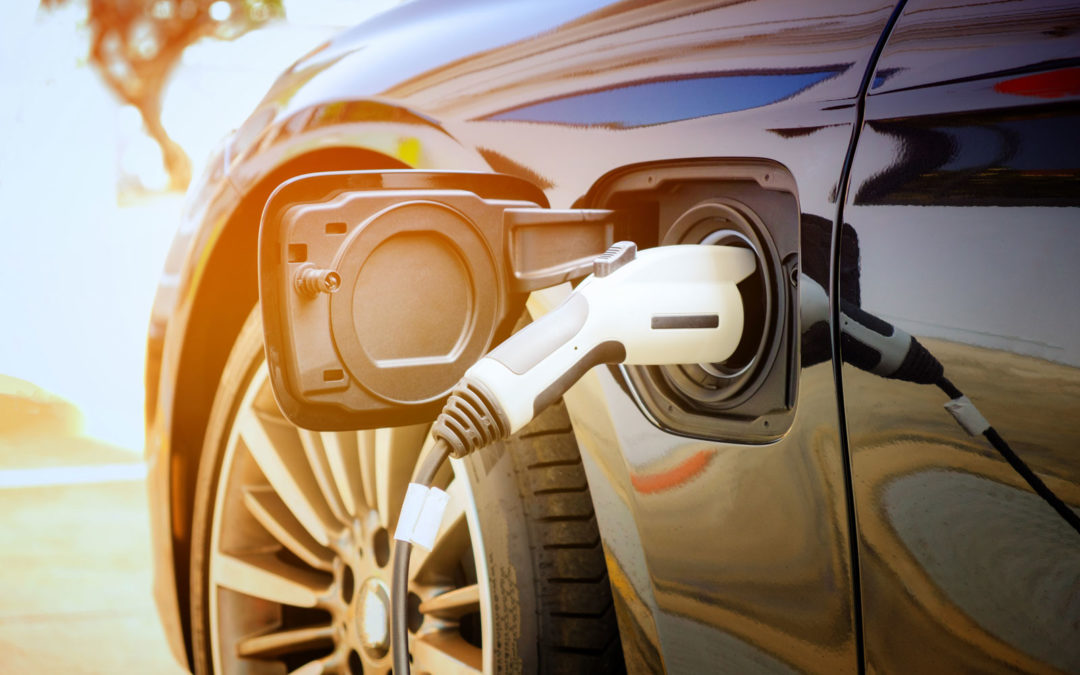
by Jane McCurry | Feb 6, 2020 | Electric Vehicles, Policy
Electric Vehicle chargers are once again eligible for a tax credit
An amendment on the Federal year-end spending bill reinstated electric vehicle charger tax credits that expired in 2017. The credits will cover 30% of the cost to install an EV charger with a maximum credit of $1,000 for individual taxpayers and $30,000 for businesses. The credit will be available through the end of 2020. To claim the credit, use IRS Form 8911.
This is a big deal! The market for electric vehicle charging is still nascent, so any incentive for EV charging is a big win. Not only will it help individuals with the upfront cost of installing EV charging at home, this tax credit will help Wisconsin businesses, from workplaces to multifamily buildings, provide EV charging in their community. We hope this will be another step in the right direction for EV adoption in Wisconsin.
If you’re interested in installing public EV charging stations, check out our factsheet to learn more about why installing EV charging is a good idea and how to do so successfully.
Electric motorcycles are also eligible for $2,500 in tax credits
The amendment also extended credits for electric motorcycles. Buyers can now receive a tax credit of 10%, or a maximum of $2,500. Good news if you’re in the market for the new all-electric Harley Livewire!
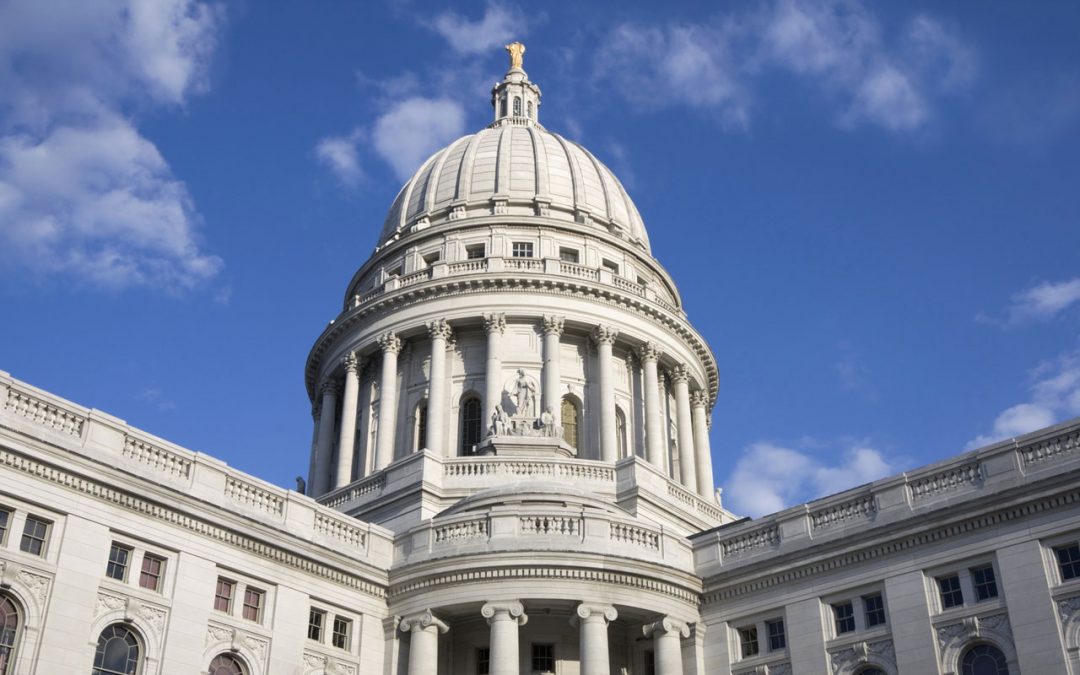
by Tyler Huebner | Jan 31, 2020 | Advocacy, Policy, Public Service Commission, Renewables
Bill Would Solidify Funding for Citizens Utility Board and Streamline Solar/Wind Permitting
RENEW Wisconsin is proud to announce our support for a legislative initiative that will support the Citizens Utility Board with a more robust level of annual funding. This bill will also streamline one element of permitting solar and wind farms of 100 megawatts or larger.
The Chairs of the Assembly Energy Committee and the Senate Utilities and Housing Committees are the co-authors of Assembly Bill 712 and Senate Bill 689, which were introduced at the request of the Public Service Commission, whose Chairperson, Rebecca Valcq, was appointed by Governor Tony Evers.
Funding for Citizens Utility Board
Citizens Utility Board (CUB) has been an important energy stakeholder since its founding in 1979. CUB’s primary role is to keep energy bills affordable for our state’s residents and small businesses.
CUB and RENEW Wisconsin have had many shared priorities over the years. Perhaps the best example is the importance of our state’s Focus on Energy program and the value of additional utility-sponsored energy conservation programs. These programs help customers save energy and save money on their utility bills, while also reducing the need to build new power plants.
As we look ahead to more coal power plant closures in Wisconsin, there is a big opportunity to strike a cost-effective balance between utility renewable energy development and customer-side solutions, including both energy efficiency and on-site renewable energy. A strong CUB will be important to those conversations.
This bill would institute a new base-funding model for CUB whereby customers of the five largest investor-owned utilities would together provide them with $900,000 in annual funding. These funds would be used by CUB to participate in most of their usual PSC activities, and they would be allowed to use outside funds to conduct other activities.
We are glad to see the PSC and Legislators find common ground to provide CUB with adequate and stable funding so they can continue to be a strong voice for ratepayers and affordable energy in Wisconsin.
Streamlining 100 MW+ Solar & Wind Farm Connections
The first two utility-scale solar farm proposals introduced in Wisconsin resulted in four “CPCN” proceedings (Certificate of Public Convenience and Necessity). Each of the two solar energy projects needed a very short connecting “tie line” to connect the solar farms into a nearby electric grid substation. That tie line is necessary to move the solar power to all the customers who can use it!
Current law mandates that the tie lines required their own separate CPCN evaluation. This bill would streamline that effort, so that a solar or wind farm and the short associated “tie line” can be reviewed together in one CPCN application. Since the renewable energy project would not be productive without the tie line and the tie line wouldn’t exist without the renewable energy resource, it makes sense to conduct their review in the same docket.
RENEW Wisconsin supports this effort which will improve project development efficiency.
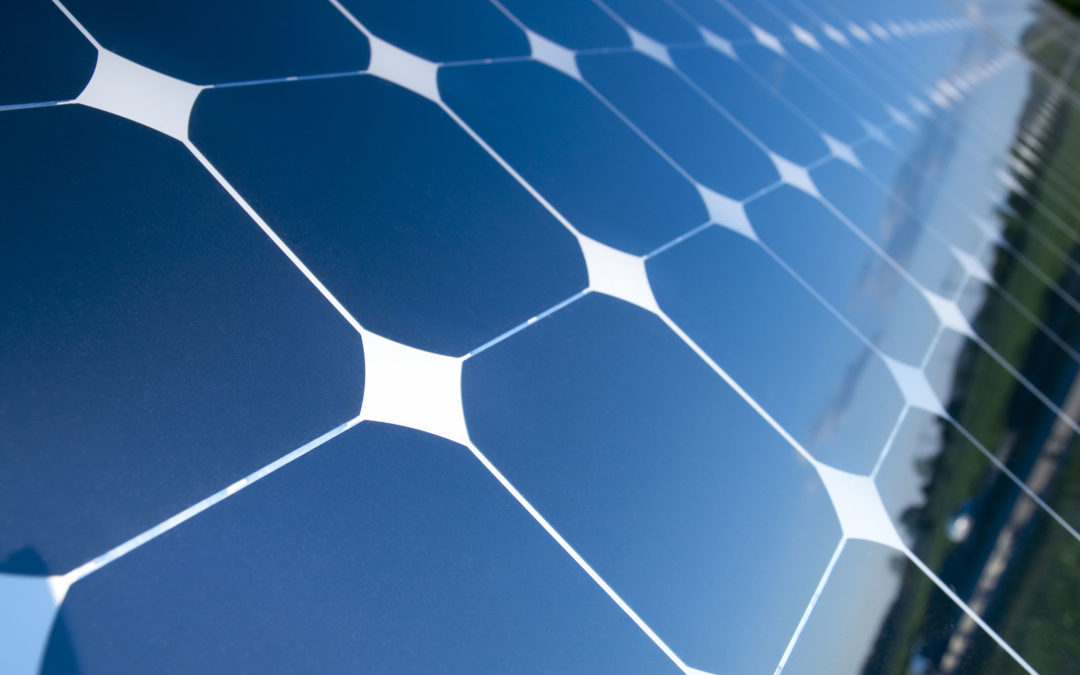
by Tyler Huebner | Jan 30, 2020 | Local Government, Public Service Commission, Solar, Utilities, Utility Scale
Today, the Public Service Commission of Wisconsin approved another solar farm: the Badger State Solar Farm to be located in Jefferson County, Wisconsin.
Badger State will be a 149-megawatt solar farm, and will supply electricity to Dairyland Power Cooperative. Dairyland is a wholesale energy provider for 24 rural electric cooperatives, 18 of which are located in Wisconsin. Dairyland also provides energy to an additional seventeen municipal electric utilities, ten of which are in Wisconsin.
The solar project’s developer is Ranger Power, one of RENEW Wisconsin’s Business Members.
This project marks the fourth solar farm approved by the Wisconsin PSC in the past 9 months, and the solar projects approved now total 699 megawatts. Badger State should be operational by 2021.
The project is expected to generate enough renewable energy to power over 20,000 homes, according to a Dairyland Power news release from March 2019, when their power purchase agreement was announced.
The project was given a unanimous verbal approval today, and a final order will follow in the next few weeks. This was the final decision made by retiring Commissioner Mike Huebsch, who announced his retirement earlier this month.
RENEW Wisconsin’s Executive Director Tyler Huebner said, “The Badger State Solar will continue Wisconsin’s steady march towards a clean, renewable energy future, and will help Dairyland Power Cooperative meet its goals to increase the sustainability and diversity of its power generation sources. Congratulations to Ranger Power and Dairyland Power Cooperative on this project approval!”
Statistics about the Badger State Solar Farm
- 149 megawatts
- Expected to produce enough electricity for about 20,000 Dairyland Power Cooperative customers each year
- Electricity Production will be about 0.4% of Wisconsin’s total 2018 electricity sales, and about 8% of Dairyland Power’s 2018 Wisconsin retail sales.
- Located on approximately 1,200 acres which is 0.5% of Jefferson County’s farmland
- The project developer expects to utilize pollinator-friendly plants under the solar panels that will help rejuvenate the soil underneath the array.
- Under Wisconsin’s energy generation shared revenue law and renewable energy incentive payment laws, the local governments where the arrays are located will receive a substantial economic boost: Jefferson County will receive approximately $348,000 annually, the Town of Jefferson $125,000 annually, and the Town of Oakland $123,000 annually.
Statistics about the 4 solar farms approved by the PSC
Badger Hollow Solar (Iowa County), Two Creeks Solar (Manitowoc & Kewaunee Counties), Point Beach Solar (Manitowoc County), and now Badger State Solar (Jefferson County) received PSC approvals between April 2019 and January 2020.
- Total of 699 megawatts of solar power production
- Expected to produce enough power for about 178,000 average Wisconsin homes’ annual energy consumption
- This amount of electricity produced would be about 2.0% of Wisconsin’s total 2018 electricity sales
- These four projects will be located on approximately 5,300 acres of land, about 0.05% of Wisconsin’s farmland. In total Wisconsin has approximately 34,700,000 acres of land.
- The hosting local governments (townships and counties) will receive $2,796,000 annually once these four projects are operational.
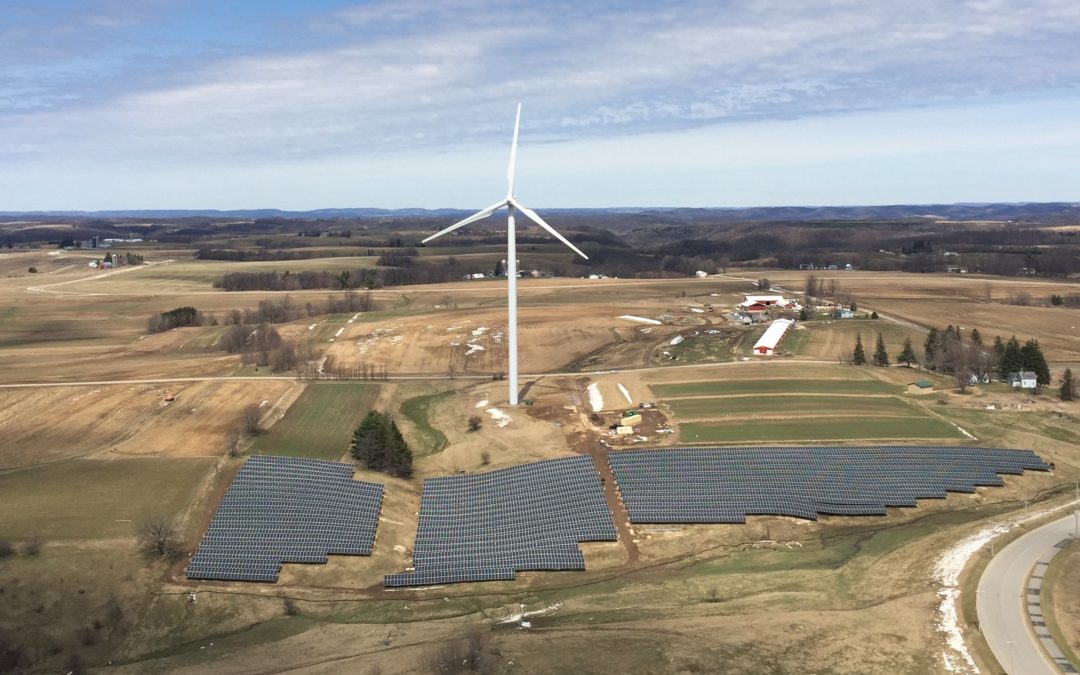
by Michael Vickerman | Jan 13, 2020 | Community, Events, RENEW Wisconsin, Renewables, Solar
At its ninth annual Renewable Energy Summit, set for Thursday January 16, 2020, RENEW Wisconsin will recognize individuals and organizations who have made significant and lasting advances in renewable energy development here in Wisconsin.
Titled “2020 Vision: The Path to 100% Clean Energy,” RENEW Wisconsin’s Summit will take place at Monona Terrace in Madison. Registration starts at 7:00 AM, with entry-level sessions on renewable energy and the electric grid at 7:30am. The main program runs from 8:30 AM to 3:30 PM. The recognition ceremony will begin at 12:45 PM. (Link to Renewable Energy Summit)
At this year’s Summit, RENEW will present five awards to renewable energy champions, developers and businesses for their leadership and accomplishments in 2019. The awards have been grouped under four categories which are listed below. They are:
- RENEWABLE ENERGY PIONEERS OF THE YEAR
- Madison Gas and Electric
- City of Middleton
- Middleton-Cross Plains Area School District
- RENEWABLE ENERGY BUSINESS OF THE YEAR
- Carlson Electric, Hayward
- RENEWABLE ENERGY CATALYSTS OF THE YEAR
- Bjorn Thompson and Jon McCarthy, Attic Angels, Madison
- Sister Rose Jochmann, Sisters of St. Francis of the Holy Cross, Green Bay
- RENEWABLE ENERGY PROJECT OF THE YEAR
- Butter Solar
- OneEnergy Renewables (developer)
- BluEarth Renewables (owner/operator)
- 10 municipal electric utilities (power purchasers)
- Organic Valley (Renewable Energy Credit purchaser)
- City of Madison (Renewable Energy Credit purchaser)
RENEWABLE ENERGY PIONEERS OF THE YEAR
This voluntary initiative, which will result in 1.5 MWAC of new solar power, involves many “firsts.” In 2017, Madison Gas and Electric (MGE) became the first electric utility in Wisconsin to launch a voluntary service that supplies electricity generated from a new solar power plant to retail customers. In 2019, MGE received approval for its first two contracts sleeved through its Renewable Energy Rider service. Ground has now been broken on an array near Middleton’s airport that will supply solar power over a 30-year period to two pioneering MGE customers, Middleton-Cross Plains Area School District and the City of Middleton. When MGE’s array is energized later this year, these utility customers will become the first in Wisconsin to receive solar power under this novel structure.
RENEWABLE ENERGY BUSINESS OF THE YEAR
A family-owned business since 1977, Hayward-based Carlson Electric has emerged as a leading solar energy contractor serving much of northern Wisconsin. In recent years, Carlson Electric has demonstrated considerable skill in financing and designing solar systems for nonprofit groups and civic entities. Indeed, Carlson’s ability to access funds through the Solar for Good program, PACE financing, and Wisconsin Energy Innovation grants was a critical factor in helping such customers as Solon Springs School District, Spooner Ice Arena, Burnett County Humane Society, and Northland Lutheran High School invest in solar power in 2019. Carlson is well on its way to completing the state’s most expansive solar initiative aimed at low- and moderate-income households. By this time next year, Carlson will have financed and installed 269 kilowatts of rooftop solar capacity directly serving 108 apartment dwellers in Sawyer County.
RENEWABLE ENERGY CATALYSTS OF THE YEAR
(1) In 2014, the Sisters of St. Francis of the Holy Cross, located in Green Bay, commissioned the installation of a 112-kW ground-mounted solar array to power the premises and serve as an outdoor classroom on clean energy. Working with the same local contractor (Eland Electric), the Sisters of St. Francis added a 98 kW array next to the existing one in 2019. The result is an inspiring and artfully arranged landscape that combines the ethic of planetary stewardship with the beauty of solar power. The leadership and guidance provided by Sister Rose Jochmann, chair of the community’s sustainability committee, was critical to the ultimate success of this initiative. In her own words: “In 2014, we had hoped to generate half of our electricity from solar but could afford only one-third. Our commitment to sustainability and care of the earth compelled us to look at our options again in 2018.”
(2) Located in Madison’s west side, Attic Angel Community is a senior living campus whose residents include many talented and dedicated volunteers. Last year, Attic Angels contracted with Pewaukee-based SunVest Solar to install PV panels on two apartment wings, totaling 98 kW. That first taste of solar power opened the door to a larger effort initiated by two volunteers living in the Attic Angels Prairie Point community, Bjorn Thompson and Jon McCarthy. Thompson and McCarthy have served on the community’s sustainability committee. Working with SunVest, they designed an offering—effectively a solar group buy—which they presented to their Prairie Point neighbors in hopes that they would take part. Of the 123 households living in Prairie Point, 40 signed up to host solar panels on their roofs, resulting in a total of 133 kW. With that initiative, combined with a 135 kW array installed in 2019 on the roof of Attic Angels’ memory care unit, the campus now hosts 366 kW of rooftop solar capacity, the largest serving a senior housing community in Wisconsin.
RENEWABLE ENERGY PROJECT OF THE YEAR
Butter Solar consists of 10 PV arrays in three states totaling 22.9 MWAC, including seven scattered across western Wisconsin with a total capacity of 17 MWAC. Taken together, the seven arrays constituted the largest addition to Wisconsin’ electric generating fleet in 2019.
From a contractual perspective, Butter Solar may be the most creative solar project in the country. Owned and operated by BluEarth Renewables, Butter Solar’s Wisconsin portfolio supplies low-cost power to the municipal utilities serving Arcadia, Argyle, Cashton, Cumberland, Elroy, Fennimore, and New Lisbon. The villages of La Farge, Viola, and Merrillan are also Butter Solar participants. The same project also generates Renewable Energy Credits for Organic Valley and the City of Madison, helping them meet their ambitious renewable energy goals.
Seattle-based developer OneEnergy Renewables, through their local Madison office, created the complex financing structure that allowed these entities to pool their resources into the project and receive value from it in return. OneEnergy also designed the arrays to blend in with the rural landscape while promoting wildlife and pollinator species. Wisconsin contractors such as Arch Electric contributed by providing expertise and high-quality workmanship.
This year’s summit program will also draw attention to other milestones and notable achievements in 2019, including the following:
- The Public Service Commission approved three large projects that will add 550 MW of solar power in the state by 2021, effectively quadrupling current levels.
- Grant County approved a 21- to 24-turbine wind project proposed by Minnesota-based Project Resources Corporation. Red Barn is the first project to be granted a permit by a local government under Wisconsin’s wind siting rule (PSC 128).
- At its Yahara landfill, Dane County completed the first project in the nation capable of receiving biogas from multiple off-site locations and injecting the cleaned-up methane into a pipeline network that serves CNG gas stations locally and across the nation.
- RENEW and Wisconsin Clean Cities team up to co-host “The Future of Transportation Day” at the State Capitol. The event engages visitors to see how vehicle technology is shaping the transportation landscape, and provided opportunities for test-driving the electric, hybrid and alternative fuel vehicles displayed outside.
- OneEnergy and Arch Electric designed and built a 1 MW array in Ashland, the third shared solar project for Xcel Energy’s Renewable*Connect program.
- Seven residential group solar purchase programs across Wisconsin accounted for 310 installations totaling 1,983 kW of new solar capacity. Both numbers represent all-time highs.
- Central Storage & Warehouse and SunPeak teamed up to install a 654 kW rooftop PV system on a third CS&W property, this one in Caledonia. With more than 2 MW powering its operations, CS&W is the second largest solar host in Wisconsin.
- Adding 230 kW of PV generation atop its parking canopies, Appleton International Airport (ATW) now has more than 500 kW of solar powering its operations, the most at any Wisconsin airport.
- RENEW’s Solar for Good program provides grants that, in 2019, leveraged the installation of more than one megawatt of solar capacity serving 27 nonprofit-owned sites across the state.
Click here for more information on the 2020 Summit program agenda, speakers, and registration.
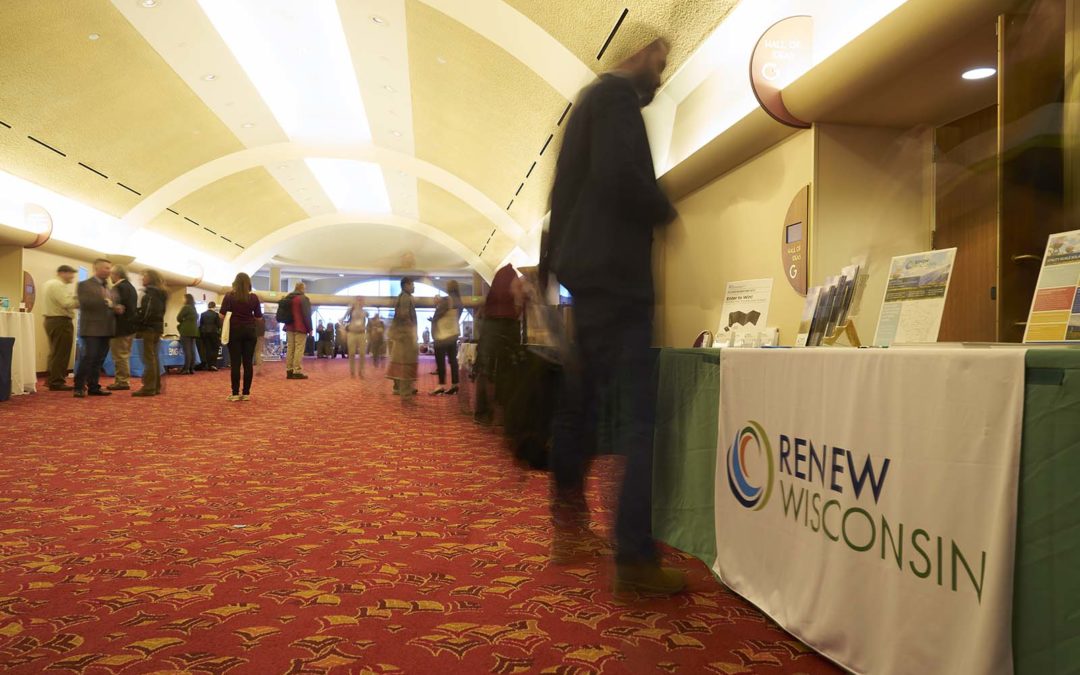
by Tyler Huebner | Jan 9, 2020 | Events
On Thursday, January 16th, RENEW Wisconsin will host its 2020 Renewable Energy Summit at the Monona Terrace from 8:30 a.m. to 3:30 p.m. The 9th Annual Renewable Energy Summit, with presenting sponsors Invenergy LLC, Zerology, and Arch Electric, is themed 2020 Vision: The Path to 100% Clean Energy, and will gather over 400 renewable energy industry experts, government officials, students, and advocates.
To register for the Summit, go to renewwisconsin.org/renewable-energy-summit/.
Clean, renewable energy is driving Wisconsin’s economy, strengthening national energy security, improving air quality, and supporting the overall quality of life for Wisconsinites. More than 40 expert speakers will discuss these clean energy opportunities and how we can work together to accelerate Wisconsin’s clean energy future.
New to the Summit this year, RENEW is offering two pre-Summit 101 sessions, one on Renewable Energy another on the Electric Grid, that will occur simultaneously beginning at 7:30 AM. As part of RENEW’s education mission, these events are free and open to non-Summit attendees as well as those attending the day-long Summit. However, individuals who wish to attend these 101 sessions must register here.
After a welcome at 8:30 a.m., policymakers will take center stage at 9 a.m. for a plenary panel titled, Policy and What’s Possible. Senator Robert Cowles, Representative Greta Neubauer, Representative Adam Neylon, and Public Service Commission Chairperson Rebecca Cameron Valcq will talk about how policy can help Wisconsin achieve a 100% carbon-free future.
At noon, Keynote Speaker Katherine Hamilton will address the audience to discuss her global perspective on clean energy before zeroing in on Wisconsin’s role, opportunity, and techniques for advancing this industry. Katherine is Chair of 38 North Solutions, a bipartisan clean energy consulting firm, and is well-known as one of the voices on The Energy Gang podcast produced by Greentech Media.
In addition to speaker sessions, the event will feature an industry exhibit with 48 organizations and an awards segment recognizing some of the most exciting and successful renewable energy projects of 2019.
RENEW Wisconsin Executive Director Tyler Huebner said, “We are so excited to have our members and stakeholders at our Annual Renewable Energy Summit to talk about the key issues, and how working together we can continue to grow this industry and opportunity for Wisconsin.”
Regular registration rates apply through January 12th with special rates for students and elected officials. Members of the media are welcome to attend for free but need to register beforehand.
Agenda – January 16, 2020 – Monona Terrace
7:30 a.m. Renewable Energy 101 or Electrical Grid 101 – Two entry level seminars to help newcomers learn the basics of renewable energy or how the electric grid works and how will it handle more renewable energy technologies like solar power, batteries and charging lots of electric vehicles.
8:30 a.m. Welcome and 2019 Energy Achievements
9:00 a.m. Panel: Policy and What’s Possible
- Public Service Commission Chairperson Rebecca Cameron Valcq
- Senator Rob Cowles, Chair, Senate Committee on Natural Resources and Energy
- Representative Greta Neubauer, Member, Assembly Committee on Environment
- Representative Adam Neylon, Member, Assembly Committee on Energy and Utilities
9:45 a.m. Renewable Energy Stories
10:15 a.m. BREAK
10:45 a.m. Breakout Sessions
- Biogas in Wisconsin’s Carbon-Free Future
- Electric Vehicles Driving Renewable Energy Growth
- Energy Storage
- Transitioning from Coal to Renewable Energy
11:30 a.m. LUNCH
12:00 p.m. Keynote Speaker, Katherine Hamilton, Chair of 38 North Solutions, specializing in clean energy and innovation and one of the voices on The Energy Gang podcast.
12:45 p.m. Awards
1:00 p.m. BREAK
1:30 p.m. Breakout Sessions
- Educating Wisconsin’s Renewable Workforce
- Large Scale Wind and Solar
- Advancing Distributed Generation
- Community-Led Clean Energy
2:30 p.m. Panel: 2020 Vision, How Do We Get to 100% Clean Energy • It’s easy to talk about the transition to 100% clean energy, but how can Wisconsin ACTUALLY make this happen?
- Shree Kalluri, Zerology, Founder and CEO
- Russell Minick, Generac Power Systems, Chief Marketing Officer
- Nichol Toomire, Alliant Energy, Director – Resource Planning, Energy Markets & Fuel Supply
3:15 p.m. Closing Remarks
3:30 p.m. Social Hour
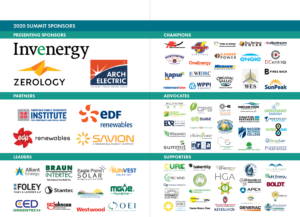
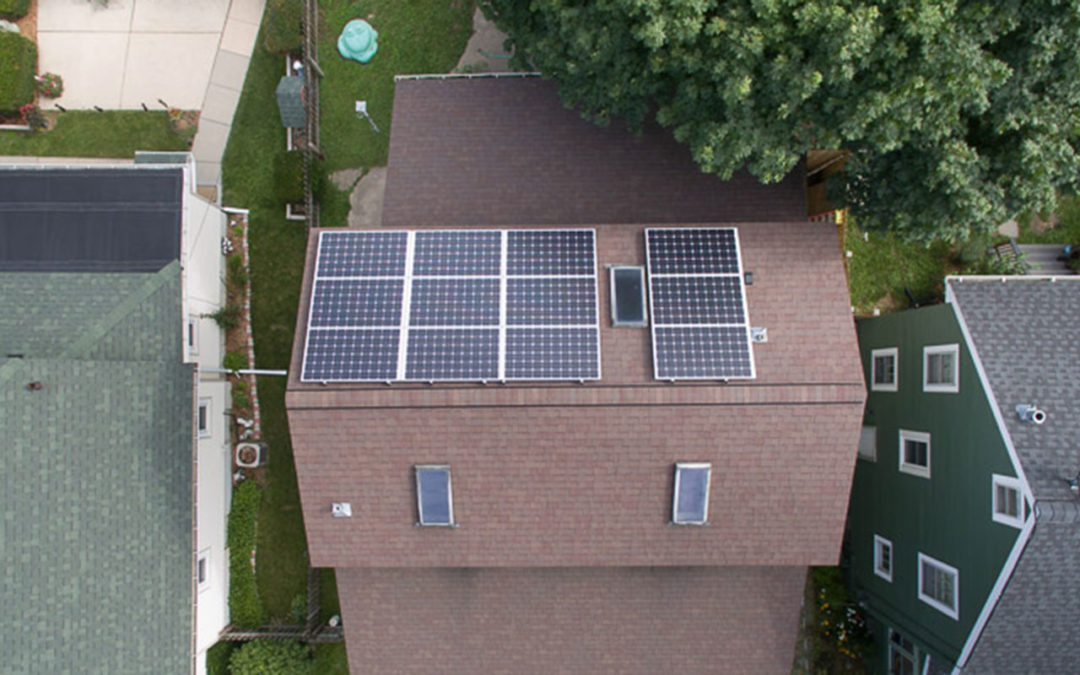
by Tyler Huebner | Jan 8, 2020 | Focus on Energy, Renewables, Solar
The Focus on Energy Renewable Energy Program had another very solid year in 2019. Late last year, the PSC approved several substantive changes in program offerings that will affect the renewable energy industry and its customers going forward. Renewable energy businesses and their customers need to learn about these changes.
First, let’s see how 2019 fared!
Focus on Energy Renewable Energy Program – 2019 Results
For non-residential customers, incentive totals declined slightly in 2019, but substantially fewer PV projects received funding: 135 in 2019 compared with 220 in 2018. At the same time, the average system size increased to 75 kW, up from 48 KW a year ago.Nearly the same number of homes received incentives in each of the past two years – 768 in 2019 compared with 750 in 2018. But more dollars were allocated in 2019 (up from $1.2 million in 2018), because system sizes were larger (7.2 KW in 2019 vs. 6.2 KW in 2018).
Geothermal continued a strong showing, with 77 total installations in 2019, compared with 68 in 2019. In addition, a small wind project received funding in 2019. No biogas projects were funded in 2019.
Changes to the Focus on Energy Renewable Energy Program for 2020
The Focus on Energy renewable energy program will undergo several important changes in 2020 – partly as a result of the trends seen in 2019. Throughout November and December 2019, the Public Service Commission voted to approve these changes, which Aptim, the Focus on Energy administrator, implemented on January 1, 2020.
First, Focus incentives for solar electric (photovoltaic or PV) projects will undergo the biggest change. In a move that many of our members desired to improve their sales cycle, Focus will be changing to “first-come, first-serve” prescriptive incentives for ALL solar PV projects starting in 2020.
However, as demand is expected to remain strong, the elimination of the competitive incentive program for larger PV projects means that fewer dollars will be available for individual projects. This is especially true for larger PV systems. Whereas a customer in 2019 could apply for a maximum incentive of $400,000 through the competitive program, this year the maximum incentive is set at $60,000.
The rationale for this change is to spread available funding across more solar PV projects and incentivize smaller PV projects. We had members with a multitude of opinions on this change, but this is what the PSC and Aptim, respectfully, have landed on.
The tables below shows the 2020 Solar PV incentive levels.
Residential Customer Solar PV Incentives
Business Customer Solar PV Incentives
At the bottom of this post, I’ve included a number of additional details about the 2020 solar program. You can learn more about 2020’s solar program at https://focusonenergy.com/residential#program-renewable-energy
Second, the competitive (RECIP) program will continue for other types of renewable energy projects, such as biogas, small wind, solar thermal, or biomass technologies. The hope is that by taking solar PV out of that competitive program, other technologies may have a better chance of getting funded.
Third, geothermal technologies will be moving out of the Renewable Energy Program in 2020. Residential geothermal incentives will be $750, and information can, for now, still be found under the residential renewable energy page. For buildings (i.e. “non-residential”) installations, geothermal will be treated like any “custom” energy efficiency measure.
Fourth, for Biogas there will still be grants available to conduct Biogas Feasibility Studies in amounts up to $15,000. In addition, biogas projects can compete in the RECIP competitive grant process. You can learn more about these opportunities at https://focusonenergy.com/business/renewables.
Here are additional details on the Focus on Energy Solar PV Program for 2020. These details were provided by Focus on Energy in late 2019 via email to their renewable energy trade allies.
Summary of Renewable Rewards updates for 2020
- The Rural portion of the program will be for residential customers and Agricultural Producers.
-
-
- Residential Rural customers will get up to a $500 bonus for installing a system. Bonus can’t be larger than prescriptive incentive. It will be equal to the incentive amount or $500, whichever is smaller.
- Agricultural Producers (Business customers) will qualify for an incentive match up to $10,000.
- Agricultural Producers are defined as “businesses engaged in the production of grain, livestock, milk, poultry, fruits, vegetables, bees and honey; fish; shellfish; or other common agricultural products including greenhouses.
- A Reservation system will be put in place for all projects.
-
- Residential customer projects will have three (3) months to complete.
- Business customer projects will have six (6) months to complete.
- There will not be a down payment requirement to reserve funding.
- Projects without a proposed completion date will be moved to the back of the queue.
- Reservation form will be posted on the website on January 3, 2020.
- All Reservations and Applications will be done online. If a customer or Trade Ally is unable to use an online version, the Program will provide them with a PDF version upon request, but it will not be available on the website.
- Azimuth rules: All projects within 90 degrees of due South (Compass Direction of 90 to 270 degrees) will be eligible for incentives and will receive the same incentive amount, regardless of azimuth.
- Projects completed in 2019 will get the 2019 incentive rate (will have 60 days from completion date to submit application).
- Projects completed in 2019 will receive the 2019 incentive rate (will have 60 days from completion date to submit application).
- Residential projects that began construction prior to November 1, 2019, and will complete before January 31, 2020 will be eligible for the 2019 incentive rate.
- Commercial projects that began construction, signed contracts, or signed purchase orders prior to November 1, 2019, but will not complete until 2020, will be eligible for the 2019 incentive rate only (12% of project cost, up to $4,000)
- Projects that sign contracts or purchase orders after November 1, 2019, and complete in 2020, will be eligible for the 2020 incentive rate.
- The total budget for Renewable Rewards is set at $4,000,000. The budget will be divided between the following customer groups and project sizes:
-
-
- Remaining funding will be posted on the website and updated every two weeks.
- For business customers: if funding in one tier is exhausted, the customer will have the option to reserve funding for the maximum amount in a smaller tier, provided funding is still available.











